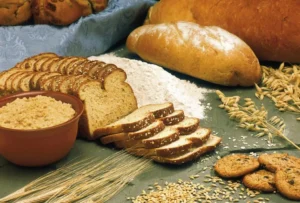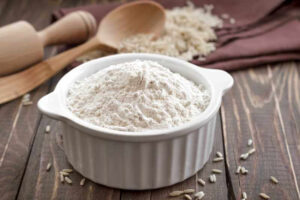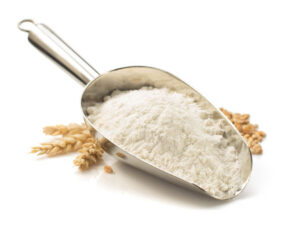Flour is a staple ingredient in many foods, but can dogs have flour? Flour is made from ground grains, such as wheat, rice, corn, or oats, and is often used in baking, cooking, and as a thickening agent in various dishes. In this article, we will expatiate the safety of flour for dogs, the types of flour that are safe for them to eat, and how to incorporate the flour into a dog’s diet healthily and safely.
Dogs can have flour, but it is crucial to consider the source and type of flour and the quantity it is given. Some types of flour, such as wheat flour, can be complex for dogs to digest, while others, like rice flour, are more easily digestible.
Additionally, certain types of flour, such as self-rising flour, contain baking powder, which can be toxic to dogs. It’s essential also to consider the quantity of flour given to a dog, as too much can lead to weight gain and other health issues.
While dogs can have flour, it is not a necessary ingredient in their diet and should be used in moderation. It’s essential to select a safe type of flour, use it in moderation, cook it before giving it to your dog, and always consider your dog’s needs.
Can dogs have flour?

When considering adding flour to a dog’s diet, selecting a safe one is essential for them to consume. Whole wheat flour, barley flour, and oat flour are considered safe for dogs in small amounts. Rice flour and corn flour are also secure options for dogs. However, avoiding flour treated with pesticides or other chemicals is essential.
Moreover, it is apparent that flour is a relatively low-nutrient ingredient and shouldn’t be the main ingredient in a dog’s diet. It can be used as a binding agent, a thickening agent in homemade dog food recipes, or a treat.
However, it’s best to limit the use of flour in a dog’s diet. Remember that dogs have different nutritional needs; some may have food allergies or sensitivities that make specific flour inappropriate.
Furthermore, it is essential to avoid using raw flour in dog food, as it can be contaminated with bacteria such as E. coli and Salmonella. These bacteria can cause food poisoning in dogs, leading to symptoms such as vomiting, diarrhea, and stomach upset.
When incorporating the flour into a dog’s diet, it’s best to use cooked flour or baked goods made with flour. This will ensure that the flour is safe for consumption and that it’s more palatable for dogs.
Is flour safe for dogs to eat?
Flour is generally safe for dogs to eat in small amounts, but it is not a necessary part of their diet and should not make up a significant portion of their meals. Too much flour can cause digestive upset in dogs, such as diarrhea and vomiting.
In addition, flour is a carbohydrate-rich ingredient commonly used in dog treats and food. It is important to note that some dogs may have food sensitivities or allergies to certain types of flour, such as wheat flour. If your dog has a history of digestive issues, it is best to avoid giving them flour or to use a grain-free alternative.
Also, it is essential to be mindful of the other ingredients in any food or treat containing flour, as some can harm dogs. For example, many commercial dog treats and human foods contain ingredients such as chocolate, xylitol (a sweetener), or raisins that can be toxic to dogs.
Can dogs have wheat flour?

Dogs can have wheat flour in small amounts as part of a balanced diet, but some dogs may have food sensitivities or allergies to wheat. Symptoms of a wheat allergy in dogs can include itchy skin, hot spots, ear infections, and gastrointestinal issues such as vomiting and diarrhea.
If your dog has a history of food allergies or sensitivities, it’s best to avoid giving them wheat flour or consult your veterinarian before introducing it to their diet.
Also, it’s essential to be careful of the other ingredients in any food or treat that contains wheat flour, as some can be harmful to dogs. For example, many commercial dog treats and human foods contain ingredients such as chocolate, xylitol (a sweetener), or raisins that can be toxic to dogs.
If you’re looking for a wheat-free option, many alternative flours are available, such as rice flour, almond flour, and coconut flour. These can be used in dog-friendly treats and food recipes.
Can dogs have rice flour?
Rice flour can be a safe alternative to wheat flour for dogs with wheat allergies or sensitivities. Rice flour is a carbohydrate-rich ingredient commonly used in dog treats and food. It is gluten-free, making it a good option for dogs with gluten allergies or sensitivities.
Rice flour is generally considered safe for dogs in small amounts, but it is not a necessary part of their diet and should not make up a significant portion of their meals. Also, it is essential to be mindful of the other ingredients in any food or treat that contains rice flour, as some can be harmful to dogs. For example, many commercial dog treats and human foods contain ingredients such as chocolate, xylitol (a sweetener), or raisins that can be toxic to dogs.
Can dogs have corn flour?

Dogs can have corn flour in small amounts as part of a balanced diet, but it is not necessary for their diet and should not make up a significant portion of their meals. Like other types of flour, corn flour is a carbohydrate-rich ingredient commonly used in dog treats and food.
It’s essential to be aware that some dogs may have food sensitivities or allergies to corn, and consuming too much corn flour can cause digestive upset in dogs, such as diarrhea and vomiting. If your dog has a history of food allergies or sensitivities, then tread in part with caution when feeding them.
It is also essential to be mindful of the other ingredients in any food or treat containing corn flour, as some can harm dogs. For example, many commercial dog treats and human foods contain ingredients such as chocolate, xylitol (a sweetener), or raisins that can be toxic to dogs.
Generally, it is best to feed your dog a balanced and complete diet formulated specifically for their nutritional needs. This will help ensure that they get all the essential nutrients needed to stay healthy and happy.
Can dogs have gluten-free flour?
Dogs can technically consume gluten-free flour, but it is unnecessary for their diet as they do not have the exact dietary needs of humans. Gluten is a protein found in wheat, barley, and rye that can cause an immune response in people with celiac disease or gluten sensitivity. Dogs do not have this issue and can digest gluten without a problem.
Furthermore, Dogs are carnivorous, and their primary source of nutrition should come from animal-based protein such as meat, fish, and eggs. Gluten-free flour, such as almond or coconut flour, is often used in human food as a substitute for wheat flour for people with celiac disease or gluten sensitivity.
How much flour can dogs have?

Dogs do not require flour in their diet, and giving them large amounts of it is not a good idea. If you would like to use flour as a treat, it’s best to use it in small quantities and as a part of a balanced diet, such as a teaspoon, and gradually increase it as needed. Monitor your dog’s reaction, do not give them more than they can handle.
It’s important to remember that flour should not replace a dog’s regular diet and should only be used as a treat in small amounts. A diet formulated specifically for dogs will provide all the necessary nutrients.
Are there any benefits of feeding flour to dogs?
Flour is a processed food product made from grinding grains such as wheat, barley, and rye, which are not a natural part of a dog’s diet. Dogs are carnivorous, and their primary source of nutrition should come from animal-based protein such as meat, fish, and eggs. Therefore, there are no significant benefits to feeding flour to dogs.
Flour is not a necessary ingredient for a dog’s diet, and it can cause digestive problems like diarrhea and gas if fed in large amounts. Also, it can be a source of added calories and sugar, which can contribute to obesity, diabetes, and other health issues. Therefore, feeding large amounts of flour to dogs is not recommended.
In some cases, flour can be used as a binding agent in homemade dog treats or food, but it’s important to remember that it should only be used in small amounts and as a balanced diet.
Can eating flour cause any health issues for dogs?

Eating flour can cause health issues for dogs, mainly if they consume large amounts of it. Flour is a processed food product made from grinding grains such as wheat, barley, and rye, which are not a natural part of a dog’s diet. Dogs are carnivorous, and their primary source of nutrition should come from animal-based protein such as meat, fish, and eggs.
Consuming large amounts of flour can cause digestive issues for dogs, such as diarrhea, gas, and upset stomach. Additionally, flour is a source of added calories and sugar, which can contribute to obesity, diabetes, and other health issues if consumed in large amounts.
Flour can also be a source of gluten, which can cause an immune response in people with celiac disease or gluten sensitivity, but dogs do not have this issue. However, it’s still best to avoid gluten-containing grains as they may not provide any nutritional benefit to the dog’s diet.
It’s important to note that dogs have different nutritional needs than humans, so it’s not necessary to include flour in their diet. If you would like to use flour in any way as a treat, you should use it in small amounts, as a part of a balanced diet, and with the consult of a veterinarian.
Can flour be used in homemade dog food recipes?
Flour can be used in small amounts in homemade dog food recipes as a binder for ingredients, but it is not necessary for a dog’s diet. Dogs are carnivorous, and their primary source of nutrition should come from animal-based protein such as meat, fish, and eggs.
While flour can be used as a binder to hold ingredients together in homemade dog food recipes, it is not a significant source of nutrition for dogs.
It’s important to remember that flour should not replace a dog’s regular diet and should only be used in small amounts as a part of a balanced diet. Homemade dog food should be nutritionally balanced and meet the dog‘s specific needs, providing all the necessary nutrients they need.
Can flour be used as a binding agent for homemade dog treats?

Flour can be used as a binding agent in small amounts for homemade dog treats, but it is not necessary for a dog’s diet. Dogs are carnivorous, and their primary source of nutrition should come from animal-based protein such as meat, fish, and eggs.
However, when using flour in homemade dog treats, it’s vital to use gluten-free flour such as almond flour or coconut flour. Gluten can cause an immune response in people with celiac disease or gluten sensitivity, but dogs do not have this issue.
It’s important to remember that homemade dog treats should be nutritionally balanced and meet the dog’s specific needs, providing all the necessary nutrients they need, and should not replace a dog‘s regular diet.
Also, it’s vital to use ingredients that are safe for dogs and avoid ingredients that are known to be toxic, such as onions, garlic, and grapes.
How to include flour in a dog’s diet?
Flour is not a necessary ingredient for a dog’s diet, and it’s not recommended to include it in their diet in large amounts. Dogs are carnivorous, and their primary source of nutrition should come from animal-based protein such as meat, fish, and eggs.
If you would like to use flour in any way as a treat, it’s best to use it in small amounts, as a part of a balanced diet, and with the consult of a veterinarian. You can use flour as a binder to hold ingredients together in homemade dog treats or food, but it’s important to remember that it should only be used in small amounts and as a balanced diet.
When using flour in homemade dog food or treats, it’s crucial to use gluten-free flour such as almond flour or coconut flour. As gluten can cause an immune response in people with celiac disease or gluten sensitivity, dogs do not have this issue.
Can flour cause allergic reactions in dogs?

The flour itself is not known to cause allergic reactions in dogs, but the grains used to make flour, such as wheat, barley, and rye, can cause allergic reactions in some dogs. These grains are not a natural part of a dog’s diet, and consuming them in large amounts can cause an allergic reaction.
Symptoms of food allergies in dogs can include itching, skin irritation, vomiting, diarrhea, and other gastrointestinal problems. If you suspect your dog may have an allergy to a specific ingredient in their diet, it’s essential to consult with a veterinarian. They will be able to diagnose and provide guidance on managing the allergy.
It’s important to note that some dogs may have gluten intolerance, a condition different from celiac disease, affecting their ability to digest gluten. If your dog has a gluten intolerance, it’s recommended to avoid gluten-containing grains such as wheat, barley, and rye and opt for gluten-free options.
It’s also important to remember that flour should not replace a dog’s regular diet and should only be used in small amounts as a part of a balanced diet. Homemade dog food should be nutritionally balanced and meet the dog’s specific needs, providing all the necessary nutrients they need.
Is flour-based dog food a good option?
Flour-based dog food is not a good option for dogs as it is not a natural part of their diet. Dogs are carnivorous, and their primary source of nutrition should come from animal-based protein such as meat, fish, and eggs. Flour-based dog food is typically made from wheat, barley, and rye, which are not a natural part of a dog’s diet and may not provide any significant nutritional benefit.
Additionally, consuming flour in large amounts can cause digestive issues such as diarrhea and gas. It can be a source of added calories and sugar, contributing to obesity, diabetes, and other health issues.
It’s important to note that commercial dog food is formulated to meet the specific nutritional needs of dogs, and it’s best to stick to a diet that is specifically formulated for them.
Conclusion
In conclusion, dogs can technically consume flour, but it is unnecessary for their diet as they do not have the exact dietary needs of humans. Dogs are carnivorous, and their primary source of nutrition should come from animal-based protein such as meat, fish, and eggs. Flour, typically made from wheat, barley, and rye, is not a natural part of a dog‘s diet and may not provide any significant nutritional benefit.
Consuming flour in large amounts can cause digestive issues such as diarrhea and gas. It can be a source of added calories and sugar, contributing to obesity, diabetes, and other health issues.
It’s important to note that flour can be used in small amounts as a binding agent in homemade dog food or treats. Still, it’s vital to use gluten-free flour, such as almond flour or coconut flour, as gluten can cause an immune response in people with celiac disease or gluten sensitivity, but dogs do not have this issue.
Generally, on whether can dogs have flour. It’s best to stick to a diet formulated specifically for dogs, which will provide all the necessary nutrients they need.


